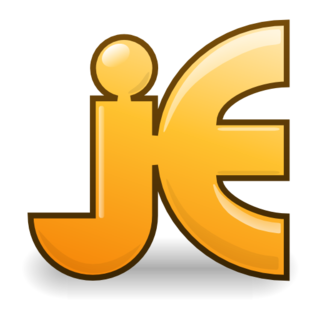
Bluefish is a free and open-source software advanced text editor with a variety of tools for programming and website development. It supports coding languages including HTML, XHTML, CSS, XML, PHP, C, C++, JavaScript, Java, Go, Vala, Ada, D, SQL, Perl, ColdFusion, JSP, Python, Ruby, and shell. It is available for many platforms, including Linux, macOS and Windows, and can be used via integration with GNOME or run as a stand-alone application. Designed as a compromise between plain text editors and full programming IDEs, Bluefish is lightweight, fast and easy to learn, while providing many IDE features. It has been translated into 17 languages.
HTML-Kit is a proprietary HTML editor for Microsoft Windows made by chami.com. The application is a full-featured HTML editor designed to edit, format, validate, preview and publish web pages in HTML, XHTML and XML -languages.

Quanta Plus, originally called Quanta, is a web Integrated development environment (IDE) for HTML, XHTML, CSS, XML, PHP and any other XML-based languages or scripting languages. Quanta was licensed under GPL before the release of version 2.0 final.

gedit is a text editor designed for the GNOME desktop environment. It was GNOME's default text editor and part of the GNOME Core Applications until GNOME version 42 in March 2022, which changed the default text editor to GNOME Text Editor. Designed as a general-purpose text editor, gedit emphasizes simplicity and ease of use, with a clean and simple GUI, according to the philosophy of the GNOME project. It includes tools for editing source code and structured text such as markup languages.
HomeSite was an HTML editor originally developed by Nick Bradbury. Unlike WYSIWYG HTML editors such as FrontPage and Dreamweaver, HomeSite was designed for direct editing, or "hand coding", of HTML and other website languages.
In computer-based language recognition, ANTLR, or ANother Tool for Language Recognition, is a parser generator that uses a LL(*) algorithm for parsing. ANTLR is the successor to the Purdue Compiler Construction Tool Set (PCCTS), first developed in 1989, and is under active development. Its maintainer is Professor Terence Parr of the University of San Francisco.

jEdit is a free software text editor available under GPL-2.0-or-later. It is written in Java and runs on any operating system with Java support, including BSD, Linux, macOS and Windows.

BBEdit is a proprietary text editor made by Bare Bones Software, originally developed for Macintosh System Software 6, and currently supporting macOS.
This article provides basic comparisons for notable text editors. More feature details for text editors are available from the Category of text editor features and from the individual products' articles. This article may not be up-to-date or necessarily all-inclusive.
Mozilla Firefox has features that allow it to be distinguished from other web browsers, such as Chrome and Internet Explorer.

Komodo Edit is a free and open source text editor for dynamic programming languages. It was introduced in January 2007 to complement ActiveState's commercial Komodo IDE. As of version 4.3, Komodo Edit is built atop the Open Komodo project. Komodo IDE is no longer supported and maintained by developers for Python.

TextMate is a general-purpose GUI text editor for macOS created by Allan Odgaard. TextMate features declarative customizations, tabs for open documents, recordable macros, folding sections, snippets, shell integration, and an extensible bundle system.

Komodo IDE is an integrated development environment (IDE) for dynamic programming languages. It was introduced in May 2000. Many of Komodo's features are derived from an embedded Python interpreter.
JSDoc is a markup language used to annotate JavaScript source code files. Using comments containing JSDoc, programmers can add documentation describing the application programming interface of the code they're creating. This is then processed, by various tools, to produce documentation in accessible formats like HTML and Rich Text Format. The JSDoc specification is released under CC BY-SA 3.0, while its companion documentation generator and parser library is free software under the Apache License 2.0.

PyScripter is a free and open-source Python integrated development environment (IDE) for Windows. It is built with Delphi's Object Pascal and Python.

Sublime Text is a shareware text and source code editor available for Windows, macOS, and Linux. It natively supports many programming languages and markup languages. Users can customize it with themes and expand its functionality with plugins, typically community-built and maintained under free-software licenses. To facilitate plugins, Sublime Text features a Python API. The editor utilizes minimal interface and contains features for programmers including configurable syntax highlighting, code folding, search-and-replace supporting regular-expressions, terminal output window, and more. It is proprietary software, but a free evaluation version is available.

Editra is a cross-platform, open-source text editor, released under a wxWindows license. It is written by Cody Precord in Python, and it was first publicly released in June 2007. As of November 2011 the project is in alpha development phase, but "stable" builds are available for download. Editra has gained notability for being a text editor incorporated in Ren'py. The main site is down as of at least July 2019.
Multi-Edit is a commercial text editor for Microsoft Windows created in the 1980s by Todd Johnson. Multi Edit Software obtained ownership rights for the product in October 2002. Multi-Edit contains tools for programmers, including macros, configurable syntax highlighting, code folding, file type conversions, project management, regular expressions, three block highlight modes including column, stream and line modes, remote editing of files via FTP and interfaces for APIs or command lines of choice. The editor uses a tabbed document interface and sessions can be saved.

Pluma is a fork of gedit 2 and the default text editor of the MATE desktop environment used in Linux distributions. It extends the basic functionality with other features and plugins.










